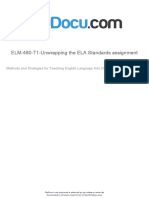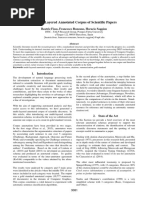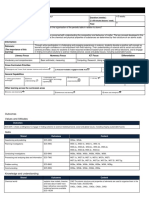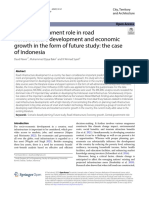Outcomes Based Learning Matrix
Outcomes Based Learning Matrix
Uploaded by
Antonette ColladoCopyright:
Available Formats
Outcomes Based Learning Matrix
Outcomes Based Learning Matrix
Uploaded by
Antonette ColladoCopyright
Available Formats
Share this document
Did you find this document useful?
Is this content inappropriate?
Copyright:
Available Formats
Outcomes Based Learning Matrix
Outcomes Based Learning Matrix
Uploaded by
Antonette ColladoCopyright:
Available Formats
OUTCOMES BASED LEARNING MATRIX
< Back to Learning Outcomes
Course: Introduction to Philosophy
Department: English
Course Description: An introductory examination of the problems and scope of philosophical inquiry, this course introduces the
student to major issues in philosophy, including theories of being, theories of knowledge, and theories of value, with attention to
the historical development of philosophical thought. Prerequisites: English Composition I (ENGL101) and Preparing for College
Reading (ENGL092) or waiver by placement testing results, or Permission of Instructor. 3 credits
Course Outcomes Learning Activities Assessment Tools
1. Read a significant sampling of the Read assigned selections Quizzes and questions on reading
writings that constitute the canon of thoughtfully, both primary sources assignment. (CT, W)
Western Philosophy. and editorial introductions and Student-composed questions and
discussions. (R, CT) vocabulary lists. (CT, QS, W)
Mid Term and Final Exams on
In-class question and answer readings. (CT, QS, W)
sessions. (OC, QS, CT)
Short papers that offer a close
textual analysis of certain reading
assignments. (W, R, CT)
• Become familiar with, or at a minimum be Attend class lectures regularly, Teacher assessment of performance
able to identify, the major philosophers and taking notes particularly on including preparation, attentiveness,
philosophical concepts generally accepted as information not found in texts. (QS, and appropriateness of questions
central to Western Philosophy CT) and comments of the student.
Quizzes, exams and papers on
philosophers and philosophical
Participate in class (or online)
concepts. (QS, CT, W)
discussions about the concepts
involved. (QS, CT, TS) Internet research. (TS)
Create questions that attempt to
connect reading assignments and
lecture notes.
1. Write analytical essays that examine Use writing skills from English Graded essays. (CT, W)
the arguments for and against a
given position, or philosophical
Composition I to prepare papers Peer review. (CT, QS, W)
which demonstrate an interaction
concept discussed in class. with one or more of the assigned
readings. (W, R, CT) Writing workshops. (CT, QS)
1. Become familiar with the basic Explain the differences among Quizzes, tests, and homework
elements of logical argument factual statements, opinions, and exercises (CT, QS, W, R)
arguments. (QS, OC , CT ) Short essays (W)
Differentiate between truth and Class discussion (CT, OC)
validity (QS, CT)
Identify examples of valid and
invalid reasoning (QS, CT) Group assignments (CT, OC)
Define and identify some common
informal fallacies (QS, CT)
1. To understand the relationship Compare historical information from Essays questions that ask students
between historic and philosophical other classes, both social history to compare or contrast historical
eras. and factual data, to understand eras in philosophy.
philosophers of the period. (CT) Class Discussion (CT, OC)
Introduce timelines that highlight Internet research (TS, W)
various philosophers and schools of
thought. (CT, QS) Quizzes and tests (CT, QS, W)
Show videos that illustrate and Short, class presentations. (OC)
visual historic eras. ( OC , CT )
1. To identify and differentiate the Create definitions for each branch. Quizzes, tests and homework
major branches of philosophy: ( OC , CT ) exercises (CT, QS, W)
Metaphysics, Epistemology, Ethic,
Aesthetics and Logic. Discuss the end results of each Short Essays (W)
branch. ( OC , CT ) Class Discussion (CT, OC)
Discuss a given philosopher's In-class and/or internet message
contribution to one of the branches board debates (OC, , TS)CT)
of philosophy. (CT)
1. To strengthen Core Competencies Referenced Above Referenced Above
*Indicate the Core Competencies that apply to the outcomes activities and assessment tools: Critical Thinking (CT); Technology
Skills (TS); Oral Communications (OC); Quantitative Skills (QS); Reading (R); Writing (W)
You might also like
- BFP Operational Procedures Manual PDFDocument325 pagesBFP Operational Procedures Manual PDFAnonymous zizIYFrxti100% (4)
- Elm 480 t1 Unwrapping The Ela Standards AssignmentDocument5 pagesElm 480 t1 Unwrapping The Ela Standards AssignmentRhodesia Tippitt SmithNo ratings yet
- Atos EngineDocument80 pagesAtos Engineingenieriaelectronic100% (1)
- Learning Outcomes BA - MADocument1 pageLearning Outcomes BA - MALeomar NieloNo ratings yet
- Introduction To Argumentation-3 - 973570841Document19 pagesIntroduction To Argumentation-3 - 973570841ashianna08juarezNo ratings yet
- 1 Extended WritingDocument16 pages1 Extended WritingaskaraskergazyNo ratings yet
- Week 4 ElaborateDocument3 pagesWeek 4 Elaborateapi-443484889No ratings yet
- (Syll) ARSERCH - REV-Nov2018Document13 pages(Syll) ARSERCH - REV-Nov2018Ma Chabelita OronosNo ratings yet
- Thesis ConventionsDocument8 pagesThesis Conventionstran van phuocNo ratings yet
- My Presentation 24 - 4 - 2022Document24 pagesMy Presentation 24 - 4 - 2022BussayaNo ratings yet
- RBT: R, U, Ap, Quiz: WW, Qa Loa: K, P, U,: An, E, C PT PPDocument4 pagesRBT: R, U, Ap, Quiz: WW, Qa Loa: K, P, U,: An, E, C PT PPJoana Rose FantonialNo ratings yet
- Writing at University: Evidence Not Just Description LanguageDocument1 pageWriting at University: Evidence Not Just Description LanguageSudeepNo ratings yet
- F-687753244 - Genealogy of Political IdeasDocument4 pagesF-687753244 - Genealogy of Political IdeasVardass PavardesNo ratings yet
- 172 PaperDocument8 pages172 Papercheng900300No ratings yet
- BMAN73652 Lecture 1 Part 2 2Document22 pagesBMAN73652 Lecture 1 Part 2 2xingye0915No ratings yet
- Evaluation - Thesis VDocument3 pagesEvaluation - Thesis VPaul BurgesNo ratings yet
- PERSONAL COPY Preliminary Literature Review-compressedDocument50 pagesPERSONAL COPY Preliminary Literature Review-compressedalamonjc083No ratings yet
- Grafikuli Kvleva PDFDocument10 pagesGrafikuli Kvleva PDFnnkaa koooNo ratings yet
- On The Discoursive Structure of Computer Graphics Research PapersDocument10 pagesOn The Discoursive Structure of Computer Graphics Research PapersMalek El Sayed AhmadNo ratings yet
- Klahr, D., & Li, J. (2005) - Cognitive Research and Elementary Science Instruction. From The Laboratory, To The Classroom, and Back PDFDocument22 pagesKlahr, D., & Li, J. (2005) - Cognitive Research and Elementary Science Instruction. From The Laboratory, To The Classroom, and Back PDFJorge DiazNo ratings yet
- Science Extension Assessment 2Document21 pagesScience Extension Assessment 2api-376596653No ratings yet
- Writing a good literature reviewDocument63 pagesWriting a good literature reviewawang_8375No ratings yet
- Lesson 1: The Structure of The Academic TextsDocument17 pagesLesson 1: The Structure of The Academic TextsAngelou CruzNo ratings yet
- Agenda: 1) Definición Marco Teórico. 2) Funciones 3) Etapas 4) Técnicas 5) Estadísticas de PruebaDocument8 pagesAgenda: 1) Definición Marco Teórico. 2) Funciones 3) Etapas 4) Técnicas 5) Estadísticas de PruebaEdward William Miranda Gutierrez0% (1)
- Itu Calendar AllDocument5 pagesItu Calendar Allapi-383430885No ratings yet
- Reading and Interpretation (EL4004) - ModdesDocument3 pagesReading and Interpretation (EL4004) - Moddesdiafanos1971No ratings yet
- Assessment Plan Blueprint 1Document2 pagesAssessment Plan Blueprint 1api-431233579No ratings yet
- WEEK 7Document6 pagesWEEK 7Daveson ErebarenNo ratings yet
- Jurisprudence I - Course Manual 2024 Spring SemesterDocument34 pagesJurisprudence I - Course Manual 2024 Spring SemesterRamkumaar MadhavanNo ratings yet
- Levels of Understanding Assessed by Multiple Choice QuestionsDocument11 pagesLevels of Understanding Assessed by Multiple Choice QuestionsJackielyn QuiñonesNo ratings yet
- Levels of Understanding Assessed by Multiple Choice QuestionsDocument24 pagesLevels of Understanding Assessed by Multiple Choice QuestionsJackielyn QuiñonesNo ratings yet
- Res05 Prelims ReviewerDocument7 pagesRes05 Prelims ReviewerSophia Varias CruzNo ratings yet
- Chapter 2 - Literature ReviewDocument25 pagesChapter 2 - Literature ReviewAqid AimanNo ratings yet
- Curriculum TableDocument3 pagesCurriculum Tableapi-365413277No ratings yet
- Elias Arsalah 1aDocument17 pagesElias Arsalah 1aapi-466686358No ratings yet
- PR2 Week 9Document5 pagesPR2 Week 9Melody De VeraNo ratings yet
- 2nd Sem Syllabus .Document14 pages2nd Sem Syllabus .Deepak JhaNo ratings yet
- Stag e Area Description 1 Preliminary Work: MOOC ChecklistDocument4 pagesStag e Area Description 1 Preliminary Work: MOOC ChecklistIMANE TORBINo ratings yet
- Curriculum Map: Santa Cruz Institute (Marinduque), Inc. Santa Cruz, MarinduqueDocument3 pagesCurriculum Map: Santa Cruz Institute (Marinduque), Inc. Santa Cruz, MarinduqueAnonymous PRyQ3MONo ratings yet
- The Literature ReviewDocument21 pagesThe Literature ReviewEoin ReynoldsNo ratings yet
- Identifying A Research AreaDocument11 pagesIdentifying A Research AreaSuresh VickeyNo ratings yet
- Ela07 Course at A Glance 04 10 16Document2 pagesEla07 Course at A Glance 04 10 16api-334613253No ratings yet
- 4th Literature ReviewDocument29 pages4th Literature ReviewthenoneiamNo ratings yet
- LLC6201 Course Handout_Jan-MAy 2025Document7 pagesLLC6201 Course Handout_Jan-MAy 2025nutbihariNo ratings yet
- Discourse_Deixis_and_Discourse_ProcessingDocument33 pagesDiscourse_Deixis_and_Discourse_ProcessingHasyim AsyariNo ratings yet
- English SATS - Writing Tests: Recount Explanation Procedure Persuasion Discussion (Balanced Argument) NarrativeDocument3 pagesEnglish SATS - Writing Tests: Recount Explanation Procedure Persuasion Discussion (Balanced Argument) NarrativeClaudia Patricia FernándezNo ratings yet
- AERA Literature PDFDocument9 pagesAERA Literature PDFSalman KhanNo ratings yet
- Explanatory Research Design Handout Prof - PankeDocument1 pageExplanatory Research Design Handout Prof - PankeJay R ChivaNo ratings yet
- ACE Summary PostersDocument2 pagesACE Summary PostersCristiane MoreiraNo ratings yet
- LCS2347 - Individual Assignment - EWR Assignment Guidelines - 2024-25 S1Document4 pagesLCS2347 - Individual Assignment - EWR Assignment Guidelines - 2024-25 S1sanjana JhaNo ratings yet
- Structure Of Academic TextsDocument8 pagesStructure Of Academic TextsFbootelloNo ratings yet
- Assessment Content Brief For CLT, CLT10, and CLT8Document25 pagesAssessment Content Brief For CLT, CLT10, and CLT8dietqooNo ratings yet
- Review of Related LiteratureDocument7 pagesReview of Related Literatureapi-339611548100% (3)
- Purcom 1Document3 pagesPurcom 1AngeleenNo ratings yet
- Write A Literature Review - Library Guides at University of California, Santa CruzDocument4 pagesWrite A Literature Review - Library Guides at University of California, Santa CruzSARVESH NANDGIRIKARNo ratings yet
- 1 Running Head: Curriculum Planning ChartsDocument7 pages1 Running Head: Curriculum Planning ChartsMelissa HoganNo ratings yet
- Write A Literature Review - Library Guides at University of California, Santa CruzDocument4 pagesWrite A Literature Review - Library Guides at University of California, Santa CruzSARVESH NANDGIRIKARNo ratings yet
- Writing The Literature of The Study BasicsDocument72 pagesWriting The Literature of The Study Basicsahnyvee cabuenaNo ratings yet
- Anderson Krathwohl A Taxonomy For Learning Teaching and AssessingDocument337 pagesAnderson Krathwohl A Taxonomy For Learning Teaching and AssessingMariatul Qibtiah100% (2)
- Lecture 2.2 the Literature Review_part1 (1)Document22 pagesLecture 2.2 the Literature Review_part1 (1)jocelyn202402No ratings yet
- Toefl Preparation (Paper-Based) : Overview and PracticeDocument10 pagesToefl Preparation (Paper-Based) : Overview and PracticeFerdy ArdiansyahNo ratings yet
- Pointers To Review in Empowerment TechnologiesDocument1 pagePointers To Review in Empowerment TechnologiesAntonette ColladoNo ratings yet
- Grabber BotDocument39 pagesGrabber BotAntonette Collado100% (1)
- BUSINESS MATH pt.2Document15 pagesBUSINESS MATH pt.2Antonette ColladoNo ratings yet
- Lesson 5: Culminating Activities Teacher MaterialsDocument16 pagesLesson 5: Culminating Activities Teacher MaterialsAntonette ColladoNo ratings yet
- Kindergarten How To Writing - Writers Workshop - Expository WritingDocument75 pagesKindergarten How To Writing - Writers Workshop - Expository WritingbelguesNo ratings yet
- NCM 106 Pharmacology Task Performace Written Assignment Format For FINALSDocument5 pagesNCM 106 Pharmacology Task Performace Written Assignment Format For FINALSNoemie DanaoNo ratings yet
- Project Charter and Stakeholder RegisterDocument7 pagesProject Charter and Stakeholder RegisterAsad AlyNo ratings yet
- Assignment 3 - Standard CostingDocument4 pagesAssignment 3 - Standard CostingJayhan PalmonesNo ratings yet
- The Geodetic Datum and The Geodetic Reference SystemsDocument6 pagesThe Geodetic Datum and The Geodetic Reference SystemsKismetNo ratings yet
- Digital Advertising Sales Director in Denver CO Resume Cynthia RailsbackDocument2 pagesDigital Advertising Sales Director in Denver CO Resume Cynthia RailsbackCynthiaRailsbackNo ratings yet
- Naskah Soal Bahasa Inggris Kelas IxDocument2 pagesNaskah Soal Bahasa Inggris Kelas Ixsmp ypak ptpn 3No ratings yet
- Futaba r617fs ManualDocument1 pageFutaba r617fs ManualAntonioDuartedeOliveiraNo ratings yet
- Regional Directory 2022Document2 pagesRegional Directory 2022Krizzia Mae TabangcuraNo ratings yet
- Is-14226 1995Document10 pagesIs-14226 1995김동은No ratings yet
- Method Statement For Pipeline StringingDocument8 pagesMethod Statement For Pipeline Stringingmagumnahs najanNo ratings yet
- Development of Cotton Picker Fire Monitoring SysteDocument13 pagesDevelopment of Cotton Picker Fire Monitoring SysteHarmawan FebriantoNo ratings yet
- Navy 460285Document15 pagesNavy 460285Vijay PrakashNo ratings yet
- Industrial Aspects of Physical ChemistryDocument34 pagesIndustrial Aspects of Physical ChemistryAmaan KaziNo ratings yet
- ES Exercise 23-24副本 2Document47 pagesES Exercise 23-24副本 2singyuetchan05No ratings yet
- Central Government Role in Road Infrastructure Development and Economic Growth in The Form of Future Study: The Case of IndonesiaDocument12 pagesCentral Government Role in Road Infrastructure Development and Economic Growth in The Form of Future Study: The Case of IndonesiaRidho ridhoNo ratings yet
- Randfile 01Document40 pagesRandfile 01Sergio DiazNo ratings yet
- Dissertation SoundDocument7 pagesDissertation SoundBuyPsychologyPapersSingapore100% (2)
- Modul Pretest 1 ILC 2023Document2 pagesModul Pretest 1 ILC 2023ayuNo ratings yet
- Manuale8ps CianetDocument95 pagesManuale8ps CianetMauricio CarletNo ratings yet
- AGT Biodiesel Pretreatment PFT00374ENDocument6 pagesAGT Biodiesel Pretreatment PFT00374ENJerryChen100% (1)
- Introduction Genetic QuantitativeDocument34 pagesIntroduction Genetic QuantitativeArif Mulyanto100% (3)
- Statistics Midterm ExamDocument4 pagesStatistics Midterm ExamKristine Love Q. MorenoNo ratings yet
- Sodium Silicate: 2 PropertiesDocument7 pagesSodium Silicate: 2 PropertiesvirgilyNo ratings yet
- (RIZAL 101) First HomecomingDocument6 pages(RIZAL 101) First HomecomingMae PandoraNo ratings yet
- Sensors and Controls To Ensure An Energy-Efficient Textile Production - PLEVADocument14 pagesSensors and Controls To Ensure An Energy-Efficient Textile Production - PLEVA呂仲書No ratings yet
- Breakdown Alpha Trade in GoldDocument29 pagesBreakdown Alpha Trade in GoldEdwin LoaizaNo ratings yet




























































































